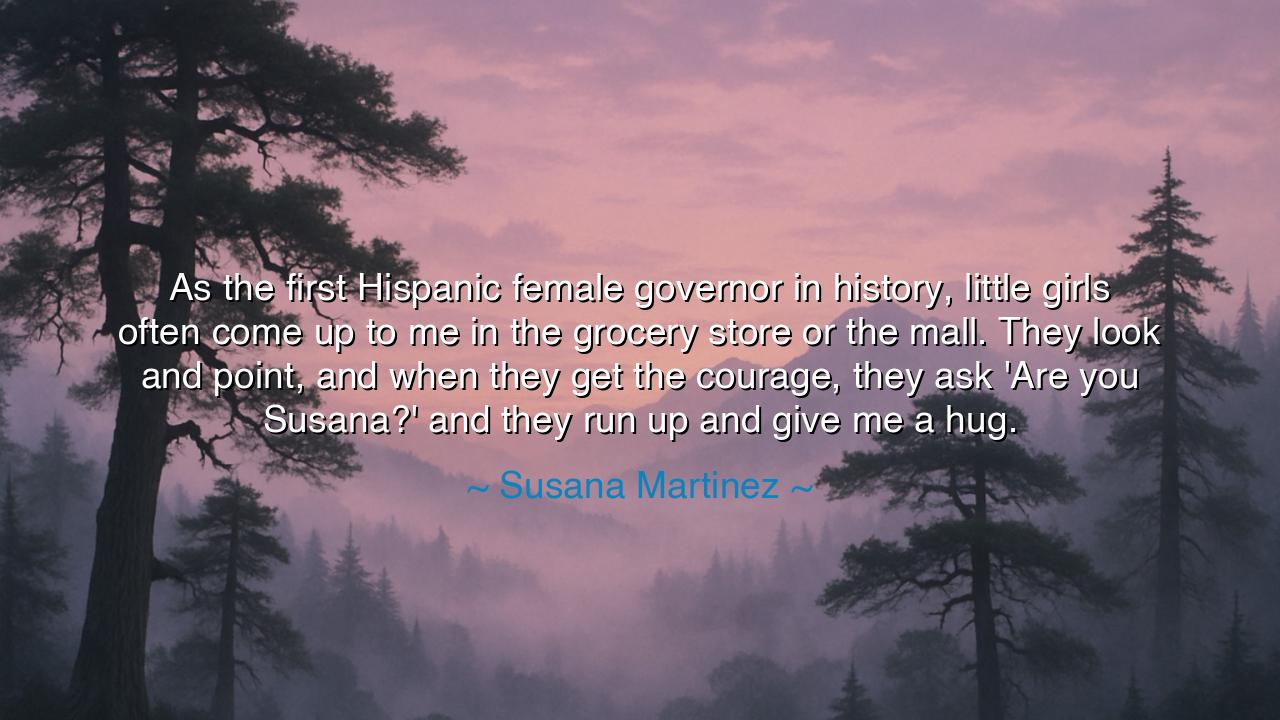
As the first Hispanic female governor in history, little girls
As the first Hispanic female governor in history, little girls often come up to me in the grocery store or the mall. They look and point, and when they get the courage, they ask 'Are you Susana?' and they run up and give me a hug.






When Susana Martinez, the first Hispanic female governor in the history of the United States, spoke of little girls recognizing her in the grocery store or the mall, she revealed something profound and tender about the power of representation. She said: “As the first Hispanic female governor in history, little girls often come up to me in the grocery store or the mall. They look and point, and when they get the courage, they ask, ‘Are you Susana?’ and they run up and give me a hug.” In these simple, human moments—moments far removed from the grandeur of politics—Martinez speaks to something eternal: the way one life, by breaking a boundary, can become a beacon for countless others.
This quote is not about political triumph, but about visibility, about the light that shines when someone who was never meant to be seen steps into history. For centuries, women of color, especially Hispanic women, were told—silently or loudly—that leadership was not their destiny. They were expected to serve, not to lead; to follow, not to command. And yet, when Susana Martinez took the oath of office as the governor of New Mexico in 2011, she did not merely assume power—she opened a door that had long been sealed. Every little girl who sees her now, in the flesh or in the headlines, does not see a politician alone; she sees possibility. That is why they point, and whisper, and gather their courage to approach.
The origin of this quote rests in the small, sacred interactions that Martinez often described in interviews and speeches. She spoke of being approached by young girls, their eyes wide with wonder, unsure whether to believe that someone who looked like them could truly hold such authority. It was a reflection of her own journey—from the daughter of a police officer and a security guard in El Paso, Texas, to the highest office in her state. Her story mirrors that of every child born into modest beginnings who dares to dream of greatness. But what is most beautiful about her words is not her pride in being recognized—it is her humility, her recognition that greatness is not proven in grandeur, but in the hope one kindles in another heart.
This encounter—between a leader and a child—is ancient. The philosopher Plutarch once wrote that the true leader “does not light the torch of the people, but shows them that they carry the flame within.” This is what Martinez’s quote embodies. When those girls find the courage to approach her, they are not only honoring her achievement; they are awakening the courage within themselves. It is as if they are saying, “If she can, then so can I.” In that instant, the boundaries that history drew around them dissolve. The act of the little girl running forward to embrace her is not a simple gesture—it is an inheritance of courage, passed from one generation to the next.
Throughout history, such moments have defined human progress. When Harriet Tubman led enslaved people to freedom, she became not just a savior, but a symbol—proof that courage can bloom even in the darkest soil. When Sally Ride became the first American woman in space, little girls across the world looked up at the stars and saw not just light, but invitation. And when Susana Martinez stood as a governor, she continued that lineage. Her presence was not an act of self-glorification—it was a living lesson that identity need not be a limitation, but a source of strength. These small interactions—the smiles, the embraces—are the evidence that the cycle continues, that courage once born in one heart can echo through a thousand others.
Martinez’s quote also speaks to a quieter truth: that leadership is not confined to podiums or policy—it lives in example. A true leader’s legacy is measured not by their victories, but by how many others they inspire to rise after them. Every time a little girl sees her reflection in a leader like Martinez, the walls that divide the possible from the impossible grow weaker. This is how civilizations evolve—not by decree, but by vision; not by words alone, but by the living example of those who dare to step first.
And so, my children of the spirit, take this lesson to heart: you never rise alone. Every victory you earn, every fear you conquer, lights the path for someone who walks behind you. Do not think your efforts go unseen. The way you carry yourself, the courage with which you pursue your calling—these things ripple outward, shaping futures you will never witness. If you find yourself standing where no one who looked like you has stood before, know that you are not standing for yourself alone. You are the proof that others needed, the voice that breaks silence, the flame that awakens courage.
For this is the wisdom hidden in Susana Martinez’s gentle words: that greatness is not defined by how high you climb, but by how many others find the courage to climb after you. When those little girls whisper her name and embrace her, they are not only honoring her—they are stepping into their own destiny. And so must we all, for history moves forward only when one soul dares to live so boldly that others learn to believe in themselves.






AAdministratorAdministrator
Welcome, honored guests. Please leave a comment, we will respond soon